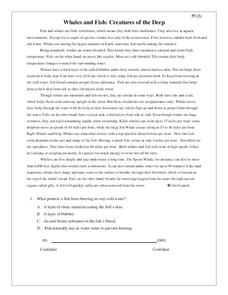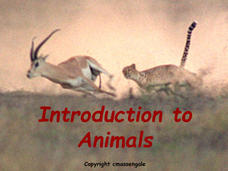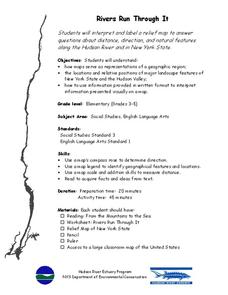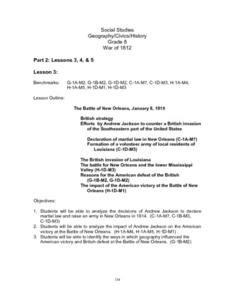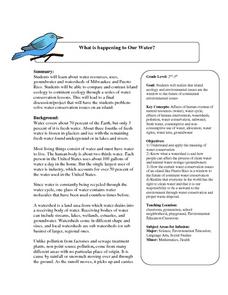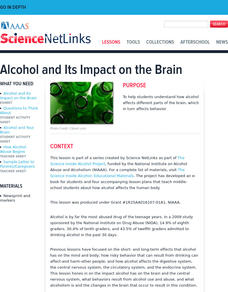Curated OER
Whales and Fish: Creatures of the Deep
Practice comparing and contrasting details in informational text with a reading passage about whales. It explains the ways that fish and whales are similar, as well as the ways they are different, and specific characteristics of various...
Science Matters
Wave Watching
Seismologists use the direction and arrival times of p waves and s waves to determine the distance to the source of an earthquake. The engaging lesson has students line up to form human waves. Through different movements when attached,...
Biology Junction
Introduction to Animals
Out of all animals, elephants alone lack the ability to jump. Scholars learn all about animals using a presentation full of fun examples. It describes different types of animals, the biological similarities and differences between...
Curated OER
All About Teeth
Chomp chomp! Learn which teeth perform which tasks with a thorough worksheet on molars, incisors, and canines. Based on descriptions of each kind of tooth, fifth graders label a diagram that points to particular teeth. They then color in...
Curated OER
X-Ray Eyes
Students observe Australian X-ray paintings for information and to understand the art techniques used. Then they imagine and draw the inner organs of an animal. Students also research the anatomy of the animal to analyze the accuracy of...
Curated OER
Rivers Run Through It
Using a relief map of New York State, learners answer questions about the distance between different cities, identify bodies of water, and more. First, they discuss vocabulary related to the Hudson River area. Then, they complete a...
Curated OER
Water Pollution
Students explore the causes of water pollution. In this environmental lesson plan, students conduct experiments with natural filtration systems.
Curated OER
Fish Around the World
Students use a globe to answer questions such as which continent they live in and the country in which they live. They identify at least two bodies of water near their state and two foreign countries. In groups, they complete a...
Curated OER
Kansas Ponds, Lakes & Reservoirs
Students compare the ponds, lakes, and reservoirs of Kansas. In this geography lesson, students use Google Earth to research the different ponds, lakes, and reservoirs in Kansas. Students will discover that many of the bodies...
Curated OER
Mapping Landforms of South Carolina
Third graders analyze South Carolina maps. In this geography lesson, 3rd graders locate the five land regions in the state are and discuss how the regions are different. Students identify the major bodies of water and analyze how...
Curated OER
War of 1812
Eighth graders locate the major land forms and bodies of water on a map of Louisiana. In groups, they discuss the role of the Mississippi River in the Battle of New Orleans and how land and water affect the outcome of battles. To end...
Curated OER
Body Percussion: Hambone
Learners explore body percussion. They practice playing quarter notes and eighth notes separately, then quarter and eighth notes at the same time by different groups. They practice this exercise at different tempos.
Curated OER
Weather Olympics
Students consider the effects of topography on climate patterns. In this earth science lesson, students research weather patterns and make inferences of how the land forms may create different climates. Students compare Celsius...
Curated OER
Body Shields: Peaceful Protesters or Iraqi Pawn?
Students research human shields, mostly European peace activists who stand against war. They guard civilian sites to prevent attack on schools, hospitals, etc. Student research is to include articles by those who support the war as well...
Illustrative Mathematics
How Many Cells Are in the Human Body?
Investigating the large numbers of science is the task in a simple but deep activity. Given a one-sentence problem set-up and some basic assumptions, the class sets off on an open-ended investigation that really gives some...
Curated OER
A Coin Out of Water
Pupils examine the Michigan state quarter and identify land and water on the quarter. They locate the Great Lakes and other bodies of water on a map. They compare and contrast streams, rivers, ponds, lakes, and oceans.
Curated OER
Water Quality and the St. Mary¿¿¿s River Project Monitoring
Students list different parameters of water and explain how each is important to the balance of the St. Mary ecosystem. They identify the different instruments and explain what they test.
Curated OER
The Nutrients Public Transportation System
Students investigate the human circulatory system by experimenting with hoses. In this human body lesson, students create a system of hoses simulating the circulatory system which they utilize to pass objects through....
Curated OER
What is Happening to Our Water?
Students compare and contrast Wisconsin's water resources to that of Puerto Rico. They research books about islands, particularly the Puerto Rican islands. Student view illustrations of island ecology. They discuss the illustrations and...
Curated OER
Tongue Map
Students explore human anatomy by conducting a human senses experiment. In this taste lesson, students identify the main purpose of a tongue and how it enhances our eating habits. Students utilize baking coca, lemon juice, salt and honey...
Curated OER
The Insect Files
Young scholars are provided with a physical description of the insect, in words and graphics, including body parts, special adaptations, color, and so on. They explore and report on all four elements of an insect's habitat: food, water,...
Curated OER
Billy Brown and The Belly Button Beastie
Students read the book Billy Brown and The Belly Button Beastie and complete a variety of activities related to the book. In this reading lesson plan, students complete activities including discovering body parts, bubbles, retelling,...
Curated OER
Alcohol and Its Impact on the Brain
Students examine water as it changes states. In water and ice lesson students study the water cycle and what happens to it as it changes state.
Curated OER
Skeletal, Skin, and Muscular Systems
Eighth graders explain the functions of various body systems. Using a concept map, 8th graders identify and explain the fuctions of the skeletal, skin, and muscular systems of the body. After completing their concept map, students...


